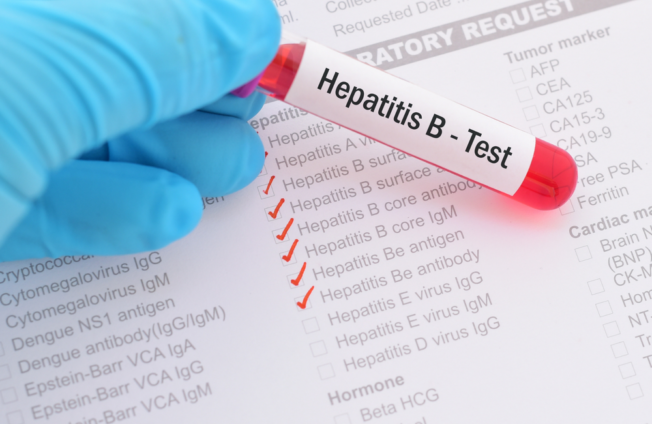In his village, Uwasi, in Ghana’s Upper East Region, Thomas Abanga*, 27, has seen all too often how viral hepatitis can bring tragedy.
“I have attended funerals of friends and family members who died from viral hepatitis. So when I was diagnosed with hepatitis C, I lost hope and thought I would die anytime soon,” says Thomas.
However, 2 years after his diagnosis, Thomas is beaming healthily, thanks to Ghana’s growing hepatitis C response.
Hepatitis is an inflammation of the liver, with causes including viruses and other infections, alcohol and certain drugs. It leads to a range of health problems, some of which can be fatal.
Globally, 90% of people living with viral hepatitis do not know they have it, and 3 000 people die of the disease every day. WHO’s global hepatitis strategy, endorsed by all WHO Member States, aims to reduce new hepatitis infections by 90% and deaths by 65% between 2016 and 2030.
In 2019, an estimated 1.2 million new hepatitis infections and 125 000 hepatitis- B and C related deaths occurred in the African Region. In recognition of this burden, the need for a comprehensive response is included in the Framework for an Integrated Multisectoral Response to TB, HIV, STIs, and Hepatitis in the WHO African Region, where more than 91 million Africans are living with hepatitis.
Poverty and inequality leave people vulnerable to infection
In Ghana, viral hepatitis is a major health concern for health authorities. Hepatitis B is hyper-endemic, with an estimated prevalence in the population of 9.1%. Hepatitis C also poses a high burden, with an estimated prevalence of 3.3%.
Hepatitis disproportionately affects the people of northern Ghana. Here, poverty and inequitable access to quality healthcare services mean people are more vulnerable to infections than in other parts of the country.
At present, there is no effective vaccine against hepatitis C. However, early diagnosis and treatment can cure over 95% of people, which also helps prevent further transmission of the virus. In Ghana, despite high rates of infection, testing and treatment for hepatitis B and C have historically been very low due to the high costs of services and limited access to treatment. This is now changing due to a dedicated effort by the government to tackle the disease.
Taking action to prevent and treat viral hepatitis
The increasing burden of hepatitis infections requires urgent action at all levels to protect people and communities. In 2017, the Ministry of Health and the Ghana Health Service, through the National Viral Hepatitis Control Programme (NVHCP), and with support and technical guidance from WHO, developed national guidelines for the prevention, care and treatment of viral hepatitis.
Dissemination of these guidelines has helped to improve the knowledge of health care workers and bridge gaps in access to treatment, as there were limited healthcare workers able to administer treatments across the country. Progress has been made but more health worker training is needed.
In March 2023, the government of Ghana, with support from the government of Egypt, WHO, and other partners, launched the ‘STOP Hep C Ghana Project’. This initiative reaches out across the nation, from cities to villages, providing free treatment for hepatitis C across all levels of care to all Ghanaians with active infection.
The STOP Hep C Ghana project has provided life-changing hepatitis C drugs and regular counselling from treatment locations to 220 people close to where they live. A further 780 people are also expected to benefit from free treatment project by end of 2023.
“The hepatitis C treatment project is the first person-centred intervention by the government that responds directly to the needs of people affected by hepatitis. We are exploring partnerships to support delivery so that eliminating hepatitis in Ghana can be put on sound footing,” says Dr Atsu Seake-Kwawu, Programme Manager of the NVHCP.
In addition, the country is making strong progress to combat hepatitis B, for which there is a vaccine. Ghana has 99% coverage through the infant routine vaccination programme and is planning to introduce the hepatitis B vaccine at birth soon. Additionally, a testing and treatment programme for hepatitis B is being proposed.
In line with its guidelines, WHO has provided financial and technical support to the NVHCP since 2011, including capacity building for healthcare workers and awareness raising on how to manage and prevent hepatitis.
“As WHO, we are excited that the fight against viral hepatitis is fast gaining momentum in Ghana. Alongside efforts to make treatment available across the country, we continue to support Ghana to do more on viral hepatitis prevention and risk reduction,” says Professor Francis Kasolo, WHO Representative to Ghana.
Latest Stories
-
Gold Fields Ghana Foundation challenges graduates to maximize benefits of community apprenticeship programme
1 hour -
GBC accuses Deputy Information Minister Sylvester Tetteh of demolishing its bungalow illegally
1 hour -
Boost for education as government commissions 80 projects
1 hour -
NAPO commissions library to honour Atta-Mills’ memory
2 hours -
OmniBSIC Bank champions health and wellness with thriving community walk
2 hours -
Kora Wearables unveils Neo: The Ultimate Smartwatch for Ghana’s tech-savvy and health-conscious users
2 hours -
NDC supports Dampare’s ‘no guns at polling stations’ directive
2 hours -
Police officer interdicted after video of assault goes viral
2 hours -
KNUST’s Prof. Reginald Annan named first African recipient of World Cancer Research Fund
2 hours -
George Twum-Barimah-Adu pledges inclusive cabinet with Minority and Majority leaders
3 hours -
Labourer jailed 5 years for inflicting cutlass wounds on businessman
3 hours -
Parliament urged to fast-track passage of Road Traffic Amendment Bill
3 hours -
Mr Daniel Kofi Asante aka Electrician
3 hours -
Minerals Commission, Solidaridad unveils forum to tackle child labour in mining sector
3 hours -
Election 2024: Engagement with security services productive – NDC
3 hours

